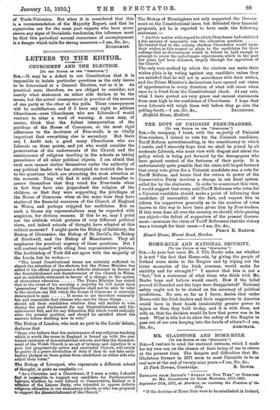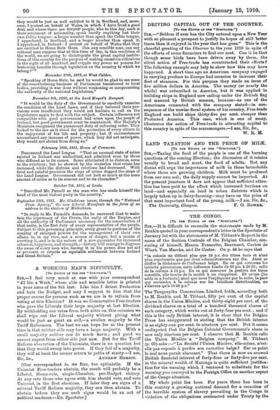MR. GLADSTONE AND HOME-RULE.
[To TOR EDITOR Of THE "SPRCTATOR."1 venture to send the enclosed extracts, which I made for my own use, on the chance of their being of use to others at the present time. The dangers and difficulties that Mr. Gladstone foresaw in 1871 seem to most Unionists to be as real now at the end of twenty-nine years.—I am, Sir, &c., 13 Park Terrace, Cambridge. R. Bowse.
EXTRACTS FROM IRVING'S "ANNALS OF OUR TINE" OF SPEECHES BY KR. GLADSTONE ON IRISH MATTERS, 1871-1885.
September 26th, 1871, at Aberdeen, on receiving the Freedom of the
City.
"If the doctrine of Home Rule were to be established in Ireland,
they would be just as well entitled to it in Scotland, and, more- over, I protest on behalf of Wales, in which I have lived a good deal, and where there are 800,000 people, who to this day, such is their sentiment of nationality, speak hardly anything but their own Celtic tongue—a larger number than speak the Celtic tongue, I apprehend, in Scotland, and a larger number than speak it, I apprehend, in Ireland—I protest on behalf of Wales that they are entitled to Home Rule there. Can any sensible man, can any rational man suppose that at this time of day, in this condition of the world, we are going to disintegrate the great capital institu- tions of this country for the purpose of making ourselves ridiculous in the sight of all mankind, and cripple any power we possess for bestowing benefits through legislation on the country to which we belong?"'
November 27th, 1879, at West Calder.
" Speaking of Home Rule, he said he would be glad to see some of the overwhelming business of Parliament transferred to local bodies, providing it was done without weakening or compromising the authority of the national Legislature."
November 9th, 1880, at the Lord Mayor's Banquet.
"It would be the duty of the Government to carefully examine the condition of the Land Laws, and if they believed their pro- visions were insufficient they would not hesitate to call on the Legislature again to deal with the subject. Certain influences not compatible with good government had come upon the people of Ireland, but good government must be maintained. Her Majesty's Ministers recognised the paramount duty of enforcing order. They looked to the law as it stood for the protection of every citizen in the enjoyment of his life and property; but if circumstances necessitated any increase of power, which they did not anticipate, they would not shrink from doing so."
February 28th, 1881, House of Commons.
Denounced the Land League. "That an unusual state of crime existed in Ireland was undoubted, and admitted even by those who differed as to its causes. Some attributed it to distress, some to the evictions; but ho showed by the statistics that crime has increased, while the distress and evictions had decreased. With fatal and painful precision the steps of crime dogged the steps of the Land League. Government did not look so much at the mere amount of crime as to its sources and to its character."
October 7th, 1881, at Leeds.
"Described Mr. Parnell as the man who has made himself the head of the most violent party in the country."
September 18th, 1885. Mr. Gladstone issues, through the "National Press Agency," the new Liberal Manifesto in the form of an address to the electors of Midlothian.
"In reply to Mr. Parnell's demands, he answered that to main- tain the supremacy of the Crown, the unity of the Empire, and all the authority of Parliament necessary for the conservation of that unity, is the first duty of every representative of the people. Subject to this governing principle, every grant to portions of the country of enlarged powers for the management of their own affairs is, in my view, not a source of danger, but a means of averting it, and is in the nature of a new guarantee for increased cohesion, happiness, and strength ;—history will consign to disgrace the name of every man who, having it in his power, does not aid or prevents or retards an equitable settlement between Ireland and Great Britain."







































 Previous page
Previous page